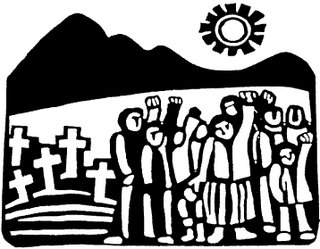Paralysis of Analysis

(Okay, so I'm just going to start off by saying that this post is dedicated to Nick, Mike, Amy, Omar, and Ramsey, as well as anyone else from the Time For Peace fellowship. We have shared some deep, paralyzing discussions together, so you'll know what I'm talking about with this.)
When I first saw this cartoon, I thought it was hilarious (thanks, Nick, for the link). Then I thought, wow, that's a little too revealing of my own intellectual and spiritual dysfunctions.
It's that question: "Do you really need that." That question haunts me, stalks me, and, often, renders me useless to society. Yes, I, as someone who is all too aware of the effects my actions/choices/ideas/thoughts/words/etc. have on this world, suffer from what Dr. King called the "paralysis of analysis." In other words, in an effort to minimize the amount of resources and energy I expend through daily living (i.e., in order to live in a way that meets my basic needs, yet makes it possible for everyone else in the world to meet their needs), I, often, am caught in situations where my choices leave me in a Catch-22. I try to live into what I feel is the Christian imperative to "be the change I wish to see in the world," yet I do this, sometimes, at the risk of my own well-being.
In short, I am paralyzed by my own conscience in a world that, all too often, seems entrapped by immoral and unjust forces.
Here's an example: It's cold in my room. I would feel more comfortable if I turned on the space heater, but I know that doing so will use a lot of energy, which, in turn, will add to the CO2 emissions (via the coal-burning electric companies), which, in turn, will contribute to global warming. It's sounds like a stupid quarrel, I know... but, deep down inside, the quarrel makes perfect sense (theologically, spiritually, intellectually, etc.). Furthermore, I think that the personal and social call of justice necessitates such inner struggles, which leads me to conclude that part of "being the change" is, occasionally, being paralyzed by one's own analysis.
However, that line of thinking does nothing to alleviate the occasional reaction of "This sucks!" Analysis does suck. Living just on a need-level does suck. It sucks trying to track down fair trade, sweatshop-free clothing while it seems like everyone else just goes to Wal-Mart to get their shirts and shoes.
Or, rather, it can suck, if one gets trapped into thinking that ethical living is an end in itself.
I must admit that there are times when I reduce my life (and, consequently, my faith) to a series of ethical choices; and, in such times, I find myself getting depressed, saddened, and, ultimately, paralyzed.
Yet, in these times, I have always been redeemed by the grace of God and have, consequently, been able to turn away from my service to morality and toward my service to God and God's promise of the coming kin-dom and the establishment of the Beloved Community. In other words, I remember that my striving to "be the change" is my direct response to the grace and to the very real freedom I have received through God (in Christ).
Again, morality is a response, not a goal.
That said, I would like to argue that being paralyzed by our analysis is not something we can (or should) avoid. In fact, it is a necessary part of grace-filled living. However, I believe that, when we live in a state of true freedom (i.e., when we realize that our lives do not have to be dictated and/or controlled by the Powers That Be), we are able to cope with the paralysis of analysis, move past it, and, ultimately, "keep on keepin' on."
True freedom is being able to say that I do not depend on Wal-Mart for my survival. True freedom is being able to say that I do not need to use fossil fuels in order to feel fulfilled. True freedom is being able to say that I do not (in the case of the cartoon above) need to play billiards in order to be happy. True freedom is not being afraid, as Jesus said, of those who can "kill the body, but are unable to kill the soul" (Matt. 10:28). True freedom is believing there is a better way, and living into that belief.
Without true freedom, morality becomes an end in itself, and the paralysis that results from that morality just plain "sucks."
With true freedom, morality becomes a natural response, and the "paralysis of analysis" serves as a reminder that "the gate is narrow and the way is hard" (Matt. 7:14), but that, ultimately, the path leads to life.

